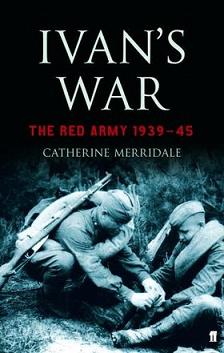
Ivan’s War
Catherine Merridale
396 pages including index
published in 2005
Though things have improved a lot since the end of the Cold War, the Eastern Front is still underrepresented in western histories of World War II. Quite naturally British and American historians have focused mostly on their own countries’ experiences in the war but even so the Russian experience is still under-represented. And often when the Eastern Front is looked at, it is from a German rather than a Russian perspective. German historians, generals and others were quite quick in putting forward their experiences in order to put the record straight in their favour, German sources were much more available to western historians than Russian sources, stuck behind the Iron Curtain as they were. So we got plenty of Konsalik novels talking about poor, intelligent middle class German officers stuck in the hell of the Ostfront facing the Slavic hordes, not so much about the poor Russian soldiers trying to liberate their homelands. What’s more, Cold War ideology, which presented an outnumbered NATO alliance trying to defend itself against the vast communist tank armies poised to overrun Western Europe at any moment, quite easily identified itself with the German experience and was fed by the same German generals that had been defeated by the Russians on how best to fight the bolshevik menace.
So it’s good to see a book like Ivan’s War be published. It’s the first book I’ve read about the Eastern Front that looks at the war there not just through a Russian perspective, but looks at the ordinary soldier’s experiences, somewhat comparable to e.g. Stud Terkel’s “The Good War” about American experiences of WWII. Catherine Merridale went to Russia not just to look at archives long inaccessible to western scholars, but also to talk to the veterans themselves and get their stories. What’s more, she didn’t just show the stories of the common soldiers, but also those of their officers and political commissars too and does so without editorialising. It’s important to hear those stories, to get an idea of what the Great Patriotic War was really like for those who fought it, without seeing it filtered through American or Western European, let alone German eyes for a change.
No Comments